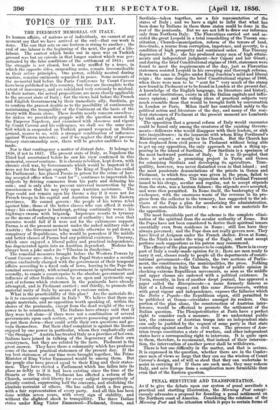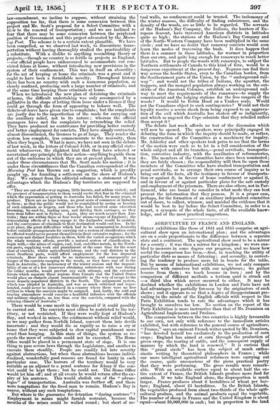PENAL SER VIT UDE AND TRANSPORTATION.
As if to give the debate upon our system of penal servitude a practical and startling illustration, the Morning Post conspi- cuously advocates a proposal for founding a penal settlement on the Northern coast of America. Considering the relations of the Morning Past and the 'attention which it pays to certain forms of law-amendment, we incline to suppose, without straining the supposition too far, that there is some connexion between this project and Mr. Scott's proposal for a Select Committee with a view to the renewal of transportation ; and we are inclined to fear that there may be some connexion between the perplexed position of Government and this project advocated by the Morn- ing Post. The scheme is to a certain extent plausible. We have been compelled, as we observed last week, to discontinue trans- portation without having thoroughly studied the practicability of a substitute. With a dislike to anything resembling theory or projects,—though no country is so fertile in projects as England, —our official people have endeavoured to accommodate our con- victed felons at i home without introducing new provisions the system of their coninement. This was in itself an absurdity ; for the act of keeping at home the criminals was a great and it ought to have been a formidable novelty. Throughout history there has been no country with such a numerous population, so closely confined, producing such a large number of criminals, and at the same time -keeping those criminals at home. When We-introduced- the 'new plan of detaining the criminals at home, the difficult undertaking was only accompanied by a palliative in the shape of letting them loose under a licence if they could go through the form of appearing to behave well. The tickets-of-leave have given rise to complaints ; but the complaints are justly due to the imperfection of the mode for carrying out the auxiliary relief, not to its nature ; whereas the official managers have met the complaints by retrenching the relief. They have produced no contrivance for providing better custody and better employment for convicts. They have simply contracted, almost discontinued, the licences to go at large. They render the System less complete, less commensurate to the necessity, than when they began it. What is more, we have not seen in the debate Of last week, in the letters of Colonel Jebb, or in any official state- Meht whatsoever,' the slightest hint that they have selected or ascertained any principle- for their action—anything to guide them out of the embarras in which they are at present placed. It was under these circumstances that Mr. Scott made his motion ; it is under these eircnati .*ces that the Canadian correspondent of the Morning Post hail Thrown out a suggestion, which is greedily Caught up, for founding a settlement on the shore of Hudson's Bay. We extract from the editorial columns a statement of the advtuitages Which the Hudson's Bay territories are supposed to offer.
"They are out-of-the-way regions, little known, and seldom visited ; and the prospect of transportation to them would excite that fear in the criminal Which the expectation of getting to Australia has failed, for many years to produce. There are no large towns, no great seats of commerce or industry in them; so that the public would not be scandalized by seeing or hearing Of such criminals as forgers, and those who had received some education becoming, by-and-by, leading men, and driving their carriages, as they have done before now in Sydney. Again, they are much nearer than Aus- tralia ; they are within three or four weeks' steam-voyage of England; the demoralizing effects of a long voyage, to the Antipodes would be avoided, and the, conveyance of criminals to their destination would cost less. In the next place, the great difficulties which had to be surmounted in Australia before suitable arrangements for carrying out a system of classification could be effected would never present themselves in those extensive regions ; for the numerous and distinct localities in them, ivith the varied occupations which the whole territory affords, provide a natural system of classification to begin with,—the mines of copper, coal, lead, and other metals, in the North- ern parts, supplying work and punishment at the same time for the worst class of convicts, whilst agricultural labour, and the coal districts in the more Southern parts, would afford employment for the less depraved criminals. Here there would be no inducement, and consequently no danger of the convicts escaping to the woods, as they have run off to the bush in Australia ; the inclemency of the winter seasons and the impossi- bility of one or of a few runaways obtaining subsistence with ease during the colder months, would prevent any such attempt, and the extensive forests which separate these regions from Canada and the United States would place an obstacle almost insurmountable in the way of escape to the more densely-populated -districts in the South. The assignment system, which was adopted in Australia, and was so .inuch criticized and repre- hended, could never. be introduced In a country where there were no free settlers to whom the convicts might be assigned. And, lastly, the cold and bracing atmosphere would exercise a healthful influence over the officials and military employes, no less than over the convicts, compared with the relaxing, climate of Australia." , .
There would be some merit in this proposal if it could possibly be carried out. The convicts must either be restricted to the ter- ritory, or 'not restricted. If they were really kept at Hudson's Bay, • and worked in mines, the confinement without relief would, as we may gather from Norfolk Island, convert them into devils incarnate ; and. they would die so rapidly as to raise a cry at home that they were subjected to slow capital punishment more cruel than hanging. In this state of things, the system as re- gards the mass of criminals could not be executed. The Home Office would be placed in a permanent state of siege. It is one thing to pass severe laws through the Legislature and another to execute them steadily. People are readily led into severity against abstractions but when those abstractions become indivi- dualized, wonderfully good reasons are found for lenity in each particular ease. The horrors of the territory would be very suitable as an adjunct to a. penal sentence for felony if the con- victl could be kept -there ; but he could not. The Home Office would let him off; and at all events he would return after the ex- piry of his sentence. This would abolish one of the " advan- tages " of transportation. Australia was further off, and there were temptations for the freed man to remain. 'Hudson's Bay is nearer, without any such temptations. But where is the guarantee for detention "during sentence " ? Employment in mines might furnish restraint, because the mouths of the mines could be walled round ; but short of ac- tual walls, no confinement could be trusted. The inclemency of the winter seasons the difficulty of finding subsistence, and the density of the woods, are as little to be regarded. The servants of the Hudson's Bay Company, the Indians the hunters of Eu- ropean descent, have traversed American districts in latitudes quite as high ; the stations of the Hudson's Bay Company and of the North-Western Company have been multiplied in the same circle ; and we have no doubt that runaway convicts would soon learn the modes of traversing the bush. It does happen that there is a summer in those latitudes, far warmer in proportion than our own, and quite long enough for runaways to reach better latitudes. But to people the woods with runaways, to subject the Northern settlements of Canada to this kind of fern, would be a dangerous experiment at the present day. Negroes can find their way across the hostile States, even to the Canadian border, from the Southernmost parts of the Union by the "underground rail- way " : and would not the tribes of Indians, the squatter, the trappers and the mongrel population always working on the out- skirts of the American Colonies, establish an underground rail- way to meet the requirements of the runaways—to supply the commissariat and the lodging stations for the free rangers of the woods? It would be Robin Hood on a Yankee scale. Would not the Canadians object to such contingencies ? Would not their loyalty receive a severe shock from being exposed to an aggrava- tion of the evil which Australia has shaken off so indignantly, and which so angered the Cape colonists that they rebelled rather than accept it ? The debate last week affords no test of the discussion which will now be opened. The speakers were principally engaged in debating the form in which the inquiry should be made, or rather, the construction of the Committee as a machinery for inquiry. Mr. Adderley and other speakers took pains to see that the terms of the motion were such as to let in a full consideration of the whole subject and all its branches,—penal servitude, transporta- tion, corrective industry, with the auxiliaries of reformatories, &c. The members of the Committee have since been nominated ; they are fairly chosen ; the responsibility will then lie upon those members of the Committee who have studied transportation and penal servitude so to arrange their own course of inquiry as to bring out all the facts, all the testimony in favour of transporta- tion or against it, in favour of home confinement or against it, and in favour of or against particular plans for the safe custody- and employment of the prisoners. There are also others, not in Par- liament, who are bound to consider in what mode they can best present the information that they possess. It is a proper case, perhaps, for the formation of an auxiliary independent committee out of doors, to collect, winnow, and marshal the evidence that it would be 'hest to lay before the Select Committee, in order to a report, a synopsis of the whole facts, of all the available know- ledge, and of the most practical suggestions.



























 Previous page
Previous page